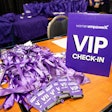
This may sound unusual, as most planners and event hosts alike expect an event to start at the time they’ve established the program. This certainly seems reasonable. But if we take the moment someone hears about the event as the actual start of that event, it shifts our frame of reference. We begin to think more about what we can do in the build up to the event, to engage guests and bring people together for a common experience, before they even set foot in your room.
Depending on the event, there are all kinds of pregame strategies you can use to engage guests ahead of time. While there is no single strategy for all situations, it’s always a good idea to brainstorm ways to engage guests from the moment they hear about the event, get their ticket or RSVP.
Start with “attendee delight.” Right from the start, what are possible ways the event host can communicate their appreciation and enthusiasm? If you have favored methods for engaging guests, consider ways you can customize or refresh them, so that they feel delightful for a specific gathering. Also, consider how you can tailor your efforts so they are in alignment with the values and mission of the hosting organization. For example, companies who value the environment probably wouldn’t stuff swag bags with key chains or other items likely to end up in a landfill. What else could work? How could you do things a little differently, so it’s more in tune with the values and vision of the group? With a little creative thought, you can come up with something delightful.
As the founder of a sales and sales training agency, I help my clients think through how they want to engage their guests before their event doors open. One of my favorite strategies is to call attendees in advance. I find this quick, upbeat phone call to serve two purposes. One, it welcomes guests and answers any questions they may have. Two, it gives us the opportunity to introduce ourselves.
Since my team runs the registration table at events with back-of-the-room sales, this phone call gives us a point of connection and familiarity with everyone in the room. These calls cost very little, yet go a long way in establishing trust and rapport with attendees who may end up making a buying decision at the event. Even if there are no sales being made from your event, it may still make sense to pick up the phone and reach out to guests.
Another popular option to engage guests before they show up in the room is to share content, or what some of my clients call “learning bites.” Depending on the context, this could be a white paper or some other useful content, delivered electronically or by mail. Maybe it’s something guests can read on the plane. Maybe it’s something to prepare for a discussion or panel. The content could be delivered on a thumb drive. It can be sent on an iPad loaded with content. Or it could even be short videos (think under twenty minutes), highlighting key concepts or ideas that will be explored further when everyone is together in person.
Along these lines, sometimes it may make more sense to ask for, rather than give out, information. Some event hosts I know swear by sending out a preevent workbook, with a series of six to 10 questions. This helps set the tone and gets guests thinking on event themes while they are still at home. You can collect the workbook a few days ahead of time, and weave those responses into a session or introductory remarks.
Finally, in some cases, the biggest gift you can give attendees is information about who else will be in the room with them. There’s an engagement app called Bizzabo that several of my clients use, where attendees can view up-to-the-minute registration information, giving them a sense of who else is registered, and even encourage them to connect with one another ahead of time. Even if you decide not to use the app, consider whether it is appropriate to circulate a guest list, and in some cases, short bios and contact information for each person.
When it comes to engaging guests before they are in the room at your event, you have plenty of possibilities to choose from. The key is to include them in your event planning and give yourself plenty of time to develop and implement your good ideas. Even the smallest effort can go a long way in boosting the vibe, morale and outcomes of your event.


















